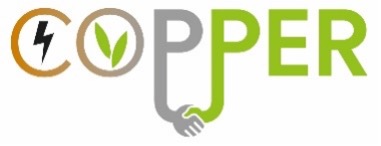Creating, Optimizing and Planning Positive EneRgy districts: connecting citizens’ energy at different geographical levels
Investigadora
As energy prices have surged throughout Europe, affecting all households (directly or indirectly) through their energy bill, citizens increasingly want to contribute to the renewable energy transition. Next to market parties and government, the role of citizens in energy communities (ECs) in developing Positive Energy Districts (PEDs) can and should be strengthened, and wider groups of citizens can be involved. From this shared problem and understanding across Europe, the project will work on ‘Creating, Optimizing and Planning Positive EneRgy districts while connecting citizens’ energy at different geographical levels’ (COPPER). The first objective is to co-develop P2P citizens-based support- and information systems that are inclusive of energy-vulnerable groups and which foster active energy citizenship. In P2P platforms information is exchanged on the energy transition, support and coaching are given, and citizens will be trained to become civil energy coaches. This will start from specific neighborhoods, and lead to exchanges between different communities and (eventually) in the wider region. Citizens' upport and information systems more generally will be identified, based on desk research and contact with key stakeholders and resident groups in each country (see letters of support). Then these platforms will be evaluated in terms of the autonomous role of citizens, facilities offered, sharing of tools, P2P help and coaching, nature of topics and challenges discussed among residents, degree of inclusiveness, and potential for innovation towards PEDs.
Moreover, PEDs need to be embedded within the wider energy system by creating reliable entities such as organized ECs with intermediary roles, linking supply, demand, and storage in the energy market. The second objective is to develop different models based on certain ‘archetypes’ of energy communities. This means the modeling of differences in both scale and configuration of ECs, in different country settings, to...
Informação do Projeto
2024-02-02
2027-01-31
Parceiros do Projeto
- CIS-Iscte (PsyChange)
- RU - Líder (Países Baixos (Holanda))
- STICHTING HOGESCHOOL VAN ARNHEM ENNIJMEGEN HAN - (Países Baixos (Holanda))
- AALBORG UNIVERSITET - (Dinamarca)
- STIFTELSEN RURALIS INSTITUTT FOR RURAL- OG REGIONALFORSKNING - (Noruega)
- EBO CONSULT AS - (Dinamarca)
- EIGERSUND KOMMUNE - (Noruega)
- SVAHEIA EIENDOM AS - (Noruega)

 English
English


